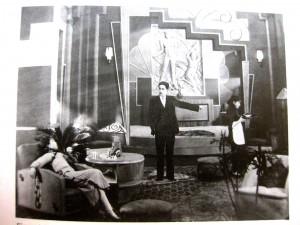the East Asia: Trans-regional Histories
with the Literature, Theater, and Cultural History of China
& the Arts and Politics of East Asia workshops
present
Professor Andrew F. Jones
Department of East Asian Languages and Cultures
University of California, Berkeley

Quotations Songs:
Portable Media and Pop Song Form in the Chinese 1960s
Monday, May 2
4:00-6:00 pm
Social Sciences Tea Room (2nd floor of SS building)
~There will be no paper circulated for this workshop meeting~
Abstract:
As the Cultural Revolution reached its crescendo in the years between 1966 and 1969, a new and remarkable form of popular music saturated Chinese public space by way of a system of hundreds of millions of wired loudspeakers that spanned the country. ‘Quotations songs” set Chairman Mao’s writings to music, and were deliberately conceived as a musical analogue and mnemonic device for The Quotations of Chairman Mao. Surprisingly, these songs adapted from what is now known as “Little Red Book” were eventually proscribed by Chairman Mao’s wife, Jiang Qing, who objected to what she saw as their off-color propensity to set listeners into pleasurable motion. Yet what could possibly be promiscuous (or even pleasurable) about a choral march in duple meter entitled (to cite just one of the more than one hundred such compositions that were published and recorded) “Ensure that Literature and Art Operate as Powerful Weapons for Exterminating the Enemy”? The answer may lie not just in the ecstatic movement which sometimes accompanied the performance of such music, but also in the deliberate promiscuity of their form. By form, I indicate not only their musical, lyrical, and ideological characteristics, but also the way in which these qualities made use of the new technological possibilities and ever expanding reach of the socialist mass media in the 1960s. Quotation songs, in a manner not radically different from popular music in the same years in the West, were designed for promiscuous movement, for effortless portability. And as with the mass-mediated pop songs of the 1960s in the US and Europe, the revolutionary songs of the 1960s owed their popularity in part to the self-conscious crafting of a ‘hook’ — a ‘catchy’ melodic figure, catchphrase, or distinctive sound that rendered a song not only recognizable but also replicable in disparate media and contexts. One of the arguments of this chapter is that the rhetorical logic of the “hook” is already implied by the citational form of the “Little Red Book” itself. Quotations songs were in fact the product and the logical conclusion of a system of what we might now call “cross-platform marketing” or “media interactivity” that took shape in the Chinese 1960s, and their power was premised on the ease with which they traveled across different media, from print to performance, from radio to records, and from the revolutionary postures of the “loyalty dance” to poster art.
This workshop is sponsored by the Center for East Asian Studies and the Council on Advanced Studies in the Humanities. Persons with a disability who need assistance, please contact Nianshen Song (nianshen@uchicago.edu), Anne Rebull (anner@uchicago.edu) or Max Bohnenkamp (maxb@uchicago.com) in advance.

